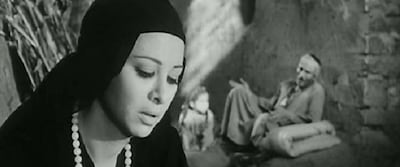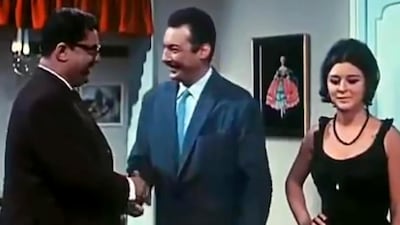The 1960s were an important time for the Arab film industry. Referred to as the “golden age of cinema”, the decade saw a new generation of directors, writers and actors emerge in a variety of genres in both black-and-white and colour films.
From romantic comedies starring two of the decade's most popular actors, Rushdy Abaza and Soad Hosny, to stark neorealist dramas, Arab films of the 1960s remain influential to contemporary culture.
We round up eight diverse films that should be on your watch list.
Al Zouga Talattashar (The 13th Wife), 1962

Celebrated actress Shadia stars in this comedy of errors alongside renowned actor and heart throb Rushdy Abaza.
Shadia plays Aida, a single and frustrated woman who finally meets the man of her dreams, Murad. They marry and Shadia prepares to live out the rest of their life in idyllic marital bliss.
However, she soon discovers that her new husband has previously been married twelve times, is an infamous womaniser and isn’t planning to take their relationship seriously despite walking down the aisle.
Blinded by rage, Aida employs the help of all of Murad’s exes in order to teach him a lesson and force him to renounce his ways by making his daily life a misery.
Umm Al Arousa (Mother of the Bride), 1963
The popular comedy starring Imad Hamdi is an insight into familial life and the financial struggles of Egypt’s lower-middle class.
Hamdi plays Husain, a married government clerk and father of four daughters and three sons. While facing the daily struggles of heading a large family, his two eldest daughters become involved with two eligible young men and want to get married.
To please his daughters and be able to afford the elaborate requests made by the groom’s ostentatious family, Husain makes the mistake of embezzling money from a financial trust in his division (with the intention of paying it back).
Husain’s actions lead to a number of challenges placing him and his family at risk, and open to social ridicule and judgment.
El Sahera El Saghira (The Little Charmer Girl), 1963

Hosny, one the Arab world’s most beloved actresses, stars in this comedy drama, sharing the screen with Abaza – one of their many successful films together.
The film follows the story of a young woman Hania, played by Hosny, who, having never met her father, is on a journey to find him. In the meantime, she meets Essmat, played by Abaza, and believes him to be her father.
Essmat plays along at first because Hania’s father owes him money and he hopes the ruse will help him get it back, but finds himself falling for Hania. This leaves him and Hania in an strange and awkward predicament.
Bayn Al Qasrain (Between Two Palaces), 1964

The first of three films based on the novels of Nobel Prize-winning author Naguib Mahfouz's The Cairo Trilogy, Bayn Al Qasrain chronicles the lives of the Jawad family at the beginning of the 1919 Egyptian revolution.
Like the novel, the film depicts the series of events that plague the head of the Jawad family, Ahmed Abdul, and the effect this has on his children within the context of the charged social and political climate of the time.
As his eldest son follows in his father’s womanising and patriotic footsteps, another joins a secret political organisation – reflecting the polarising sides many Egyptians took at the time.
The film was followed by a second and third instalment – Qasir Al Shouwiq (The Palace of Desire) in 1967 and Al Sukarya (Sugar Street) in 1973.
Al Haram (The Sin), 1965

A sombre insight into the struggles of peasant women in Egypt and the oppression of workers in the lower classes, the film stars beloved Egyptian actress Faten Hamama in one of her most memorable roles.
It follows the story of Azziza and her struggles as a peasant worker. The sole provider for herself and her husband (who is suffering from an illness), she is one day assaulted by a guard.
After discovering that she is pregnant as a result of the assault, Azziza is left with the challenges and the few choices a woman of her class must face in the small community she belongs to.
Adou Al Maraa (A Woman’s Enemy), 1966

By the mid 1960s, Abaza had cemented himself as the go-to actor to play loveable rogue playboys. He was able to give nuance to the role of the philanderer who is open to changing his ways given the right circumstances and the right woman.
He reprises the role for this incredibly popular romantic comedy where he plays a renowned author and thinker, Dr Issa, popular for his hostility and distrust towards women. While appearing as a guest on a popular TV show, he causes great public offense by sharing his thoughts and ignites the wrath of Nadia, played by Nadia Lutfi.
Smart, naive and determined, Nadia makes a bet with her girlfriends that she can discover the reason why Issa is so hateful towards women while seducing him.
As Nadia puts her plan into action and the two meet and grow close, Issa’s life is turned upside down. Not only does Issa begin to question his perspectives, he also has to reconcile a dark period in his past. Meanwhile Nadia has to face the reality that her actions towards Issa are reaffirming his extremely hostile thoughts towards women.
Saghira Ala Al Hob (Too Young for Love), 1966
Perhaps one of the most beloved and iconic Arab romantic comedies of all time – once again Abaza and Hosny – this film's premise might be seen as slightly strange in today's context. But at the time, it was considered a playful and innocent story of romance wrapped in slapstick humour.
The story follows Kamal, played by Abaza, a television producer, in search of a young unknown talented girl to star in his new television project that’s set to make his career.
Samihah, played by Hosny, is an unknown actress desperate for fame. When she sees the casting call for Kamal’s new show, she decides to audition but disguises herself as a 13-year-old girl to give her a better chance of getting the part.
She is cast mainly for her mature singing voice, and is forced to keep up the ruse of being a child while also pretending to be her own older sister.
Al Zawja Al Thaniya (The Second Wife), 1967
Hosny shows off her range as an actress in this social drama directed by Salah Abouseif, who established the neorealist style of Egyptian cinema. The film follows the story of Fatma, a married woman in a small farming village.
When the corrupt village mayor, played by actor Salah Mansour, sets his eyes on her, he abuses his power to manipulate the breakdown of Fatma’s marriage and forces her to be his second wife, to the detriment of his own family.
Once married to him, Fatma realises how much the mayor abuses and robs the villagers of their rights without their knowledge, and she plans to destroy the little empire he’s built from the inside out.


